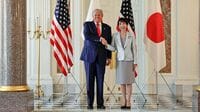BONN, Germany (Reuters) - The United States, South Korea and Japan issued a joint statement on Thursday condemning North Korea's test firing of a ballistic missile and saying Pyongyang should face an "even stronger" international response for violating U.N. resolutions.
The statement, which also condemned Pyongyang's human rights abuses, was released after U.S. Secretary of State Rex Tillerson met Japanese Foreign Minister Fumio Kishida and South Korean Foreign Minister Yun Byung-se, on the sidelines of a meeting of G20 foreign ministers.
"The ministers condemned in the strongest terms North Korea’s February 12, 2017 ballistic missile test, noting North Korea’s flagrant disregard for multiple United Nations Security Council resolutions that expressly prohibit its ballistic missile and nuclear programs," the statement said.
North Korea on Wednesday rejected a U.N. Security Council statement that denounced its missile launch and said it was exercising a sovereign right to self-defence.
The U.S., South Korean and Japanese ministers agreed to press on with their security cooperation, to defend the global nuclear non-proliferation regime and to respond firmly to any further violations by North Korea.
Tillerson reaffirmed Washington's "steadfast" commitment to defend Japan and South Korea, "backed by the full range of its nuclear and conventional defence capabilities".
Tillerson and the other ministers did not respond when asked at the start of their meeting whether the United States would send a Terminal High Altitude Area Defense (THAAD) system to bolster Japan's defences.
The U.S. military is already deploying the Lockheed Martin Corp system and its powerful Raytheon Co radar to South Korea, a move that has greatly angered China.
The three ministers vowed to continue to focus global attention on what they called "the systemic, widespread and gross violations of human rights in North Korea".
The three allies also agreed to hold consultations in the coming days on the ballistic missile and nuclear challenges posed by North Korea.
The South Korean minister met Tillerson separately before the group session, saying he viewed the discussion as "a good opportunity at this critical juncture".
(Reporting by Andrea Shalal; Editing by Madeline Chambers and Gareth Jones)



